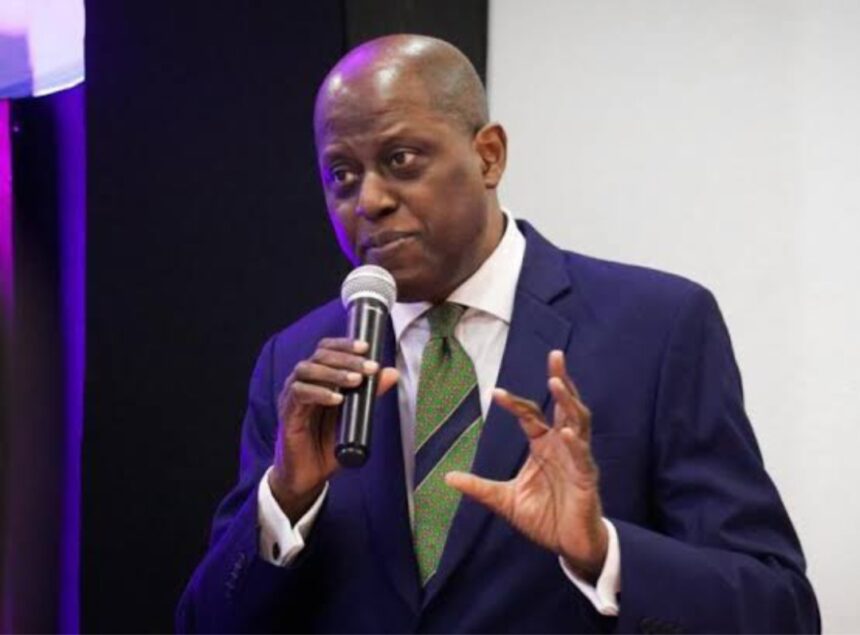– When Scandal Erodes Market Confidence: Can CBN Governor Restore Credibility?
– Regulating the Banks While His House Burns: When the Regulator Himself Needs Regulation
There are moments in history when institutions do not collapse in a single, thunderous crash; rather, they erode from within, their once-formidable walls gnawed away by the termites of compromise and complicity. Such is the tragedy that now haunts Governor Yemi Cardoso’s leadership of the Central Bank of Nigeria (CBN)—a tenure once envisioned as a harbinger of reform, now enmeshed in the murky waters of scandal.
Cardoso’s tenure was expected to be a departure from the excesses of his predecessor, a period of recalibration for an apex bank that had been bruised by public distrust. Yet, scarcely months into his stewardship, an inescapable shadow looms: the controversial hiring of consultants, the opulence of their salaries, and, most damningly, the fraud allegations trailing one of his key hires, Ms. Daphne Dafinone. The weight of this scandal is not merely a dent in his reputation—it is an indictment of the credibility of the nation’s banking regulator itself. …CONTINUE READING

Premium Times’ investigation lays bare an uncomfortable truth—Cardoso has overseen the establishment of a parallel power structure within the CBN. While the bank boasts seasoned directors and established frameworks, his administration introduced a cadre of external consultants, women with no clear mandates but wielding disproportionate influence. Ms. Dafinone, one of these consultants, has now been dragged before a Federal High Court over an alleged N100 million fraud. How does a man entrusted with regulating an entire banking industry justify such a glaring oversight in his own recruitment process?
The optics are damning. The consultants, particularly Ms. Dafinone, are reported to command salaries that dwarf those of senior CBN officials—she reportedly earns N35 million monthly. This, despite the fact that her specific role remains as nebulous as the circumstances of her appointment. Even more alarming is that the same woman now stands accused of defrauding a property developer, an allegation severe enough to demand a court hearing, yet not severe enough—apparently—for Cardoso to distance his institution from her.
For an institution that holds Nigerian banks accountable, this revelation strikes at the core of its credibility. Can Cardoso, mired in such controversy, summon the moral authority to crack down on financial malpractices within Nigeria’s banking sector? Can he, without hypocrisy, penalize bank directors for sharp practices while he himself presides over an apex bank tainted by allegations of impropriety?
The CBN is not merely another government institution—it is the fulcrum upon which the nation’s financial system balances. As its leader, Cardoso was expected to be the high priest of integrity, a steward of probity. Instead, he has allowed a personal misadventure to spiral into an institutional debacle.
Experts have weighed in on this dangerous precedent. Financial analyst Abdulrahaman Yusuf warns that “when the regulator is enmeshed in controversy, the regulated entities take note. The moment bank executives see that the CBN governor himself has questionable recruitment processes, what moral right does he have to discipline any erring financial institution?”
Public policy expert Dr. Obinna Madu agrees: “The CBN is not a private fiefdom. The arbitrary hiring of consultants, their scandalous salaries, and the complete disregard for transparency erodes public trust. If Governor Cardoso does not immediately rectify this, his entire tenure will be viewed through the lens of scandal and incompetence.”
Curiously, Governor Cardoso has chosen silence in the face of these damning allegations. There has been no official clarification, no rebuttal, no effort to distance himself or the institution from Ms. Dafinone’s legal troubles. The silence is deafening, a tacit admission that the allegations hold weight.
The failure to act swiftly sends a troubling message. It suggests either an indifference to the sanctity of due process or an inability to control the very institution he was appointed to lead. In either case, the ramifications are dire. With each passing day that the governor refuses to address the issue, confidence in the CBN continues to dwindle.
Nigeria’s economy is in dire straits, grappling with inflation, a struggling naira, and dwindling investor confidence. The CBN, as the guardian of monetary stability, plays a critical role in reassuring both domestic and international investors that the financial system is secure. But what happens when the institution itself is tainted by scandal?
Market observers argue that the ongoing saga could have real economic consequences. Economist Akin Fadeyi warns that “investors watch leadership integrity as closely as they watch interest rates. When the head of a central bank is caught in an ethical quagmire, it introduces uncertainty, and the markets detest uncertainty.”
If Cardoso does not act swiftly to reclaim his credibility, the repercussions could extend beyond his tenure. The erosion of public confidence in the CBN is not a matter that can be remedied overnight; it seeps into the very fabric of economic governance, casting a long shadow over monetary policy decisions and regulatory pronouncements.
The road ahead for Governor Cardoso is treacherous, but not beyond redemption. If he hopes to salvage his legacy and restore public faith in the Central Bank of Nigeria, decisive action is imperative.

The first step must be the immediate termination of the consultants’ contracts. Their appointments, shrouded in secrecy and controversy, have only served to erode confidence in the institution. With a wealth of experienced professionals already within the CBN’s ranks, there is no justification for retaining external consultants whose presence has disrupted the bank’s structure and credibility.
Equally crucial is a direct and transparent response to the allegations that have engulfed his administration. Silence is not a viable strategy for leadership in a time of crisis. Cardoso must publicly address the growing concerns, whether by clarifying Ms. Dafinone’s continued presence or acknowledging the missteps that have fueled public outrage. A leader earns trust not by evasion, but by facing challenges head-on.
Beyond damage control, a fundamental restructuring of the bank’s governance is necessary. The CBN must restore due process, ensuring that all appointments and contracts follow transparent, competitive procedures. The arbitrary hiring of individuals without proper oversight is not only a violation of institutional integrity but also a dangerous precedent that weakens public accountability.
Finally, Cardoso must reassure the banking sector that the CBN remains an institution of integrity and discipline. A regulatory body mired in scandal cannot effectively enforce compliance across the industry. If the governor wishes to command respect and authority, he must first demonstrate that the CBN itself is above reproach. Only through swift, deliberate action can he begin to repair the trust that has been so gravely undermined.
Governor Yemi Cardoso’s tenure at the helm of Nigeria’s apex bank is at a crossroads. His promise of reform is now overshadowed by controversy, and the integrity of the institution he leads is at stake. If he does not act swiftly, history will remember him not as the man who restored the CBN’s glory, but as the one who squandered its credibility.
The lesson here is clear: institutions do not merely falter from external shocks; they crumble from within when those entrusted with their stewardship fail to guard them with diligence. Governor Cardoso must decide—will he be remembered as the man who upheld the sanctity of the CBN, or as the leader who let scandal define his legacy?




